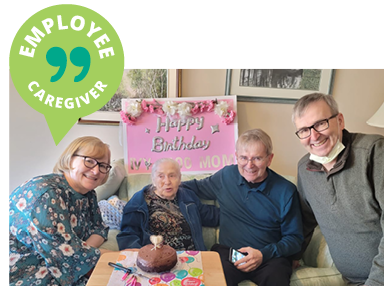Jeanne Bank,
caring for her mother
My mother is 100 years old and moved into a retirement home about 10 years ago. Luckily, my professional knowledge of the healthcare system meant that I sort of knew where to go so that my mother received the support she needed. Prior to my retirement five years ago, my career required travel and long hours. I lived 20 minutes away from my mother at the time and was providing her with a lot of support, but she couldn’t understand why I wasn’t visiting her as often as she would have liked. Now, having retired and moved two hours away to be closer to my daughter, that guilt has never really gone away. This distance means not being able to visit her regularly and feeling bad for not being there when a crisis hits.
However, I am lucky to have two brothers who share the responsibility of caring for mom. We are a really great team and we work together to make sure she receives good care. She had a bad fall after I retired and was hospitalized with a broken arm. Delirium set in and her injury triggered the rapid progression of her dementia. I spent 23 hours a week for the next two months caring for her and coordinating her move to assisted living; this would have been impossible if I was still working in my previous job.
The COVID-19 pandemic provided a bit of a silver lining for working carers in that there is more appreciation around flexibility and working from home. I am hopeful that this shows companies that employees can perform just as well while working at home. It is important to provide working caregivers with flexibility in how they work as there is such variability in the types of caregiving people do. With that flexibility, I hope more organizations develop a culture where people can openly talk about caregiving, raise issues and speak up when they need support without feeling stigmatized.
Reaching out for support is the most important thing. I have been attending Ontario Caregivers Organization workshops on the emotional and psychological aspects of caregiving. Just speaking to other caregivers with shared experiences has been a huge help. The affirmation that we are all doing our best makes you feel more confident in your caregiving role, which can be very challenging.

“The COVID-19 pandemic provided a bit of a silver lining for working carers in that there is more appreciation around flexibility and working from home.”

“The COVID-19 pandemic provided a bit of a silver lining for working carers in that there is more appreciation around flexibility and working from home.”
Jeanne Bank,
caring for her mother
My mother is 100 years old and moved into a retirement home about 10 years ago. Luckily, my professional knowledge of the healthcare system meant that I sort of knew where to go so that my mother received the support she needed. Prior to my retirement five years ago, my career required travel and long hours. I lived 20 minutes away from my mother at the time and was providing her with a lot of support, but she couldn’t understand why I wasn’t visiting her as often as she would have liked. Now, having retired and moved two hours away to be closer to my daughter, that guilt has never really gone away. This distance means not being able to visit her regularly and feeling bad for not being there when a crisis hits.
However, I am lucky to have two brothers who share the responsibility of caring for mom. We are a really great team and we work together to make sure she receives good care. She had a bad fall after I retired and was hospitalized with a broken arm. Delirium set in and her injury triggered the rapid progression of her dementia. I spent 23 hours a week for the next two months caring for her and coordinating her move to assisted living; this would have been impossible if I was still working in my previous job.
The COVID-19 pandemic provided a bit of a silver lining for working carers in that there is more appreciation around flexibility and working from home. I am hopeful that this shows companies that employees can perform just as well while working at home. It is important to provide working caregivers with flexibility in how they work as there is such variability in the types of caregiving people do. With that flexibility, I hope more organizations develop a culture where people can openly talk about caregiving, raise issues and speak up when they need support without feeling stigmatized.
Reaching out for support is the most important thing. I have been attending Ontario Caregivers Organization workshops on the emotional and psychological aspects of caregiving. Just speaking to other caregivers with shared experiences has been a huge help. The affirmation that we are all doing our best makes you feel more confident in your caregiving role, which can be very challenging.

